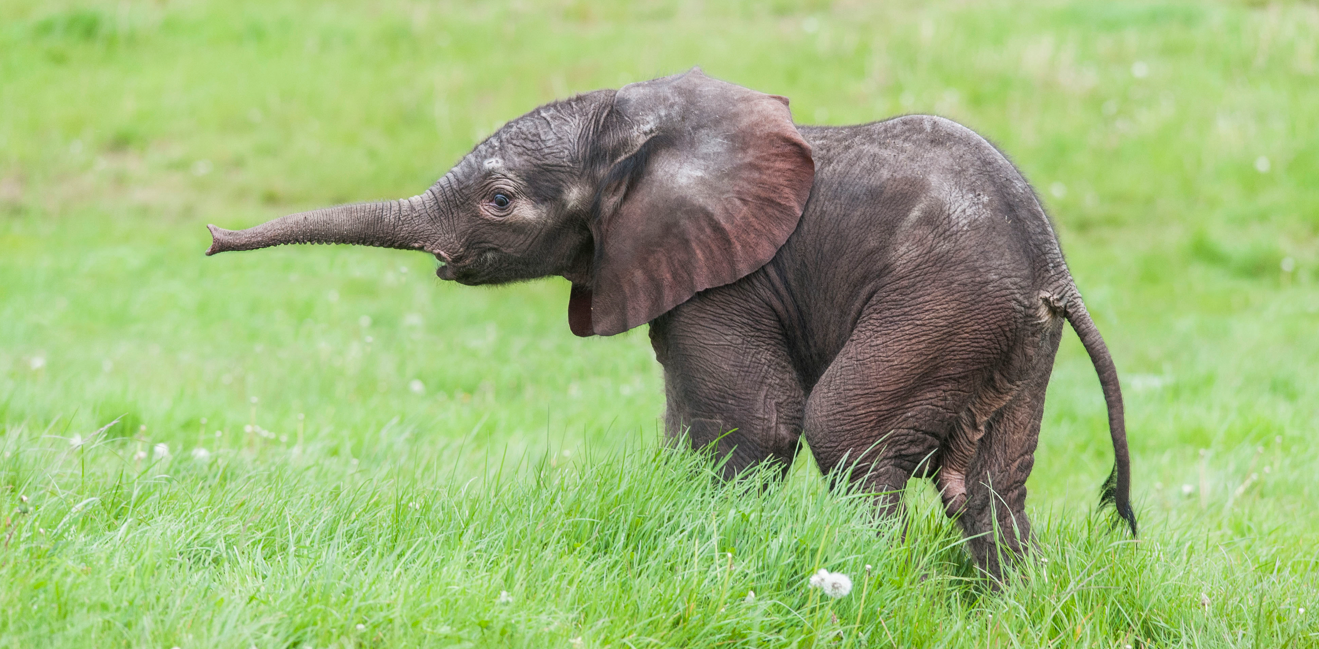Staff waved goodbye to Sutton on the morning of 9 May, as he started the journey to his new home, ‘Elephant Eden’, a state-of-the-art reserve at the Bristol attraction, with 20 acres of habitat and a large plantation for the elephants to roam and browse.
Although keepers are sad to see him go, they say that the move will see him flourish as he learns the skills and characteristics of a bull elephant, from his new, older male companions, Shaka and Janu.
Head Keeper of Elephants at the Safari Park, Andy Plumb, said, “It is a bittersweet time for me and the elephant team to see Sutton leave us. He has been here at the Park since his birth in 2014 and we have built a strong bond with him, but it is time for him to continue his journey.
“Unfortunately, African elephants face an uncertain future, with the wild population declining, meaning they are listed as ‘endangered’. Sutton’s move to Noah’s Ark Zoo Farm will enable him to continue his development and hopefully go on to become a successful breeding bull at another collection in the future, further supporting and protecting the survival of elephants into the future.”
Sutton was born on 5 May 2014 and was both the first baby elephant birthed at the Park, and the first male elephant in the world to be born by artificial insemination, using semen from a wild bull.
This means that his genetics are very important, providing a key supporting role in serving wider conservation efforts as part of the EEP (EAZA Ex-situ Programme) for African elephants.
Sutton at just a week old, at West Midland Safari Park
He was named by the Park’s guests, in honour of local teenager, Stephen Sutton, who raised a phenomenal £4.2m for Teenage Cancer Trust. Stephen had visited the Park whilst he was undergoing cancer treatment and sadly passed away a few days before Sutton was born.
To prepare for the move, elephant keepers at both collections have been working closely together, to plan the move and ensure Sutton settles in well.
Chris Wilkinson, Curator at Noah’s Ark Zoo Farm, said, “The entire team here are buzzing with excitement as we welcome the arrival of Sutton from West Midland Safari Park. Sutton joins our two bull African elephants, Shaka and Janu, at our 20-acre bull elephant facility. It is great to be part of the dedicated team who have been preparing for Sutton's arrival, building on the fantastic work of the team at West Midland Safari Park, ensuring that he will be welcomed into a safe and enriching environment.”
Sutton’s move will make way for a bull elephant to be rehomed at the Safari Park in the very near future, as a suitable companion for female elephant, Five. The hope is the pair will successfully breed, furthermore supporting the EEP for African elephant conservation.
African Elephants are listed as ‘endangered’ by the IUCN (International Union for the Conservation of Nature), with the wild population declining due to poaching for their ivory and loss of habitat. This is why it’s ever more important for wildlife collections to work together to ensure the preservation of endangered species, alongside providing the best standards of animal welfare.
West Midland Safari Park is partnered with the charity Tusk, which supports ‘in the field’ conservation through the Mali Elephant Project. This project protects a unique population of 550 sub-desert elephants and the Park annually fundraises, donates and raises awareness for this cause.
Related Members
-
News
.png?w=100&h=100&zc=1&f=jpeg&hash=97e6d151315c515d23f80e6ee9d1d533) BIAZA Blog: How Accreditation is creating change at BIAZA 25th February, 2026After two years of BIAZA Accreditation, the team delivers a look ahead on the programme to support and boost world-class zoos…
BIAZA Blog: How Accreditation is creating change at BIAZA 25th February, 2026After two years of BIAZA Accreditation, the team delivers a look ahead on the programme to support and boost world-class zoos… -
News
.png?w=100&h=100&zc=1&f=jpeg&hash=a0b01e801771c24b4d7f5c3df4abed98) Twycross Zoo Welcomes Its First Baby of 2026: An Endangered Pileated Gibbon 19th February, 2026Conservation charity, Twycross Zoo, is celebrating a heart-warming milestone with the arrival of its first baby of 2026 - an endangered pileated gibbon,…
Twycross Zoo Welcomes Its First Baby of 2026: An Endangered Pileated Gibbon 19th February, 2026Conservation charity, Twycross Zoo, is celebrating a heart-warming milestone with the arrival of its first baby of 2026 - an endangered pileated gibbon,… -
News
.png?w=100&h=100&zc=1&f=jpeg&hash=c8eadb7dce959e1a8e6be51070cd0b3b) Conservation breeding success as Endangered spotted deer fawn is born at Bristol Zoo Project 19th February, 2026An extremely rare spotted deer fawn has been born at Bristol Zoo Project, marking another important conservation milestone for this Endangered species.…
Conservation breeding success as Endangered spotted deer fawn is born at Bristol Zoo Project 19th February, 2026An extremely rare spotted deer fawn has been born at Bristol Zoo Project, marking another important conservation milestone for this Endangered species.…



